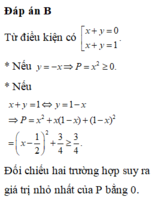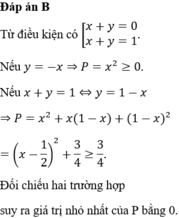Cho x,y thoả mãn x2+y2=1.Tính GTLN của biểu thức:A=x6+y6
Hãy nhập câu hỏi của bạn vào đây, nếu là tài khoản VIP, bạn sẽ được ưu tiên trả lời.


P = x6 + y6 = (x2 + y2)(x4 - x2 y2 + y4)
= (x2 + y2)2 - 3x2 y2 \(\ge1-3×\frac{\left(x^2+y^2\right)^2}{4}=1-\frac{3}{4}=\frac{1}{4}\)
Đạt được khi x2 = y2 = \(\frac{1}{2}\)
Cho x, y là hai số thỏa mãn x2 - y2 = 2
Vậy giá trị của biểu thức A = 2.(x6 - y6) - 6.( x4 + y4) là?

Ta có : \(x2-y2=2\Rightarrow\left(x-y\right)2=2\Rightarrow x-y=1\)
\(A=2\left(x6-y6\right)-6\left(x4+y4\right)\)
\(\Rightarrow2\left[\left(x-y\right)6\right]-6\left[\left(x+y\right)4\right]\)
Mà \(x-y=1\Rightarrow A=2.6-6\left[\left(x+y\right)4\right]\)
\(\Rightarrow A=6\left[2-\left(x+y\right)4\right]\)
\(\Rightarrow A=6\left[2-4x-4y\right]=6\left[2-4\left(x-y\right)\right]\)
\(\Rightarrow A=6\left[2-4.1\right]=6.\left[2-4\right]=6.\left(-2\right)=-12\)
Vậy A = -12

Ta có \(x^2+y^2=1\Leftrightarrow\left(x+y\right)^2=2xy+1\)
Từ đó \(P=\dfrac{\left(x+y\right)^2}{x+y+1}\). Đặt \(x+y=t\left(t\ge0\right)\). Vì \(x+y\le\sqrt{2\left(x^2+y^2\right)}=2\) nên \(t\le\sqrt{2}\). ĐTXR \(\Leftrightarrow x=y=\dfrac{1}{\sqrt{2}}\). Ta cần tìm GTLN của \(P\left(t\right)=\dfrac{t^2}{t+1}\) với \(0\le t\le\sqrt{2}\).
Giả sử có \(0\le t_1\le t_2\le\sqrt{2}\). Ta có BDT luôn đúng \(\left(t_2-t_1\right)\left(t_2+t_1+t_2t_1\right)\ge0\) \(\Leftrightarrow t_2^2-t_1^2+t_2^2t_1-t_2t_1^2\ge0\) \(\Leftrightarrow t_1^2\left(t_2+1\right)\le t_2^2\left(t_1+1\right)\) \(\Leftrightarrow\dfrac{t_1^2}{t_1+1}\le\dfrac{t_2^2}{t_2+1}\) \(\Leftrightarrow P\left(t_1\right)\le P\left(t_2\right)\). Như vậy với \(0\le t_1\le t_2\le\sqrt{2}\) thì \(P\left(t_1\right)\le P\left(t_2\right)\). Do đó P là hàm đồng biến. Vậy GTLN của P đạt được khi \(t=\sqrt{2}\) hay \(x=y=\dfrac{1}{\sqrt{2}}\), khi đó \(P=2\sqrt{2}-2\)
Lời giải:
$P=\frac{2xy+1}{x+y+1}=\frac{2xy+x^2+y^2}{x+y+1}=\frac{(x+y)^2}{x+y+1}$
$=\frac{a^2}{a+1}$ với $x+y=a$
Áp dụng BĐT AM-GM:
$1=x^2+y^2\geq \frac{(x+y)^2}{2}=\frac{a^2}{2}$
$\Rightarrow a^2\leq 2\Rightarrow a\leq \sqrt{2}$
$P=\frac{a^2}{a+1}=\frac{a}{1+\frac{1}{a}}$
Vì $a\leq \sqrt{2}\Rightarrow 1+\frac{1}{a}\geq 1+\frac{1}{\sqrt{2}}=\frac{2+\sqrt{2}}{2}$
$\Rightarrow P\leq \frac{\sqrt{2}}{\frac{2+\sqrt{2}}{2}}=-2+2\sqrt{2}$
Vậy $P_{\max}=-2+2\sqrt{2}$ khi $x=y=\frac{1}{\sqrt{2}}$

\(\Leftrightarrow3x^2+2y^2+2z^2+2yz=2\)
\(\Rightarrow2\ge3x^2+2y^2+2z^2+y^2+z^2\)
\(\Leftrightarrow2\ge3\left(x^2+y^2+z^2\right)\)
Có: \(\left(x+y+z\right)^2\le3\left(x^2+y^2+z^2\right)\le2\)
\(\Rightarrow\)\(A^2\le2\) \(\Leftrightarrow A\in\left[-\sqrt{2};\sqrt{2}\right]\)
minA=-1\(\Leftrightarrow\)\(\left\{{}\begin{matrix}x+y+z=-\sqrt{2}\\x=y=z\end{matrix}\right.\) \(\Rightarrow x=y=z=-\dfrac{\sqrt{2}}{3}\)
maxA=1\(\Leftrightarrow\left\{{}\begin{matrix}x+y+z=\sqrt{2}\\x=y=z\end{matrix}\right.\) \(\Rightarrow x=y=z=\dfrac{\sqrt{2}}{3}\)

a: \(A=x^2+y^2=\left(x+y\right)^2-2xy=15^2-2\cdot50=115\)
c: \(x-y=\sqrt{\left(x+y\right)^2-4xy}=\sqrt{15^2-4\cdot50}=5\)
\(C=x^2-y^2=\left(x+y\right)\left(x-y\right)=15\cdot5=75\)

\(P-\dfrac{5}{2}=x+2y-\dfrac{x^2+y^2}{2}=-\dfrac{1}{2}\left(x-1\right)^2-\dfrac{1}{2}\left(y-2\right)^2+\dfrac{5}{2}\le\dfrac{5}{2}\)
\(\Rightarrow P-\dfrac{5}{2}\le\dfrac{5}{2}\Rightarrow P\le5\)
\(P_{max}=5\) khi \(\left(x;y\right)=\left(1;2\right)\)


\(x^2+y^2=1\Rightarrow\left\{{}\begin{matrix}x^2\le1\\y^2\le1\end{matrix}\right.\) \(\Rightarrow\left\{{}\begin{matrix}\left|x\right|\le1\\\left|y\right|\le1\end{matrix}\right.\)
\(\Rightarrow\left\{{}\begin{matrix}x^6\le x^2\\y^6\le y^2\end{matrix}\right.\) \(\Rightarrow A=x^6+y^6\le x^2+y^2=1\)
\(A_{max}=1\) khi \(\left[{}\begin{matrix}x=0\\y=0\end{matrix}\right.\)